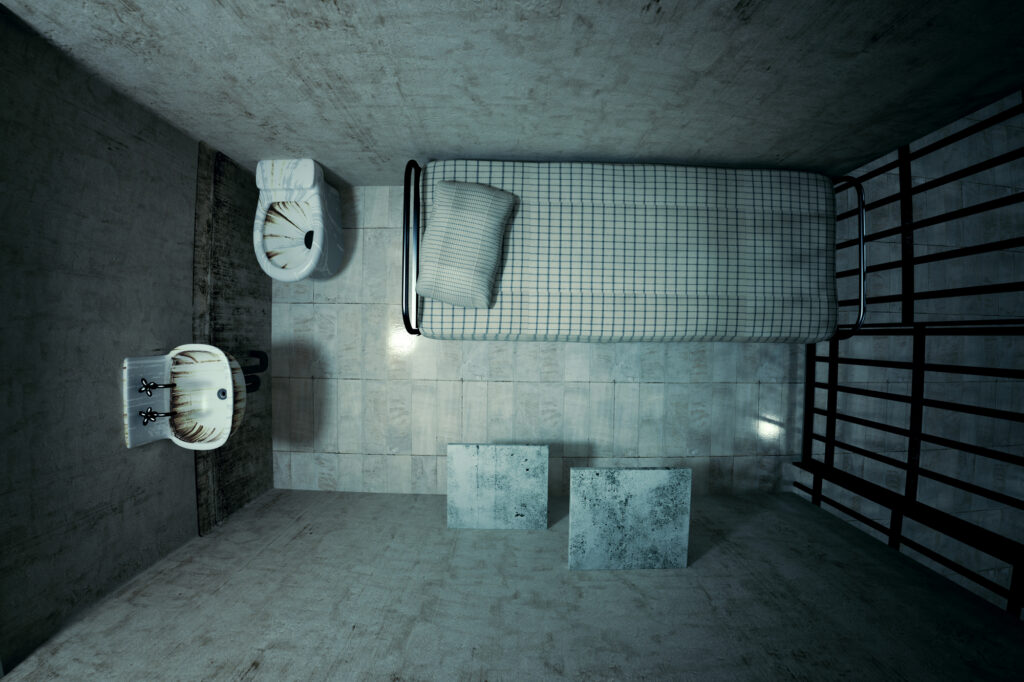A recent open forum, published in Psychiatric Services, provides an overview of assessment and treatment implications for those in prisons who meet criteria for “grave disability.” The authors, physicians Nathaniel P. Morris and Renée L. Binder, argue the importance of increased screening for grave disability to provide proper treatment for those with mental illness experiencing incarceration.
“There are additional ways by which correctional facilities might prevent incarcerated people with mental illness from becoming gravely disabled and might arrange treatment for those already meeting grave disability criteria,” the authors write. “Screening newly incarcerated people for psychiatric symptoms and connecting those who may meet criteria for grave disability with psychiatric care are essential steps.”
 Involuntary psychiatric care is typically enacted when someone is viewed as posing a danger to self or others, and the laws vary by state across the United States. Many states permit involuntary psychiatric care on the grounds of “grave disability,” which constitutes a legal standard defined as a person’s inability to provide for basic needs or self-care because of mental illness. Examples include refusing to eat due to delusions about food or someone who repeatedly flees housing due to auditory hallucinations. Legal determinations of grave disability often include contextual factors such as family or social support to help individuals meet their basic needs.
Involuntary psychiatric care is typically enacted when someone is viewed as posing a danger to self or others, and the laws vary by state across the United States. Many states permit involuntary psychiatric care on the grounds of “grave disability,” which constitutes a legal standard defined as a person’s inability to provide for basic needs or self-care because of mental illness. Examples include refusing to eat due to delusions about food or someone who repeatedly flees housing due to auditory hallucinations. Legal determinations of grave disability often include contextual factors such as family or social support to help individuals meet their basic needs.
Mental illness is highly prevalent in US correctional facilities, and incarcerated people can still meet the criteria for grave disability, which often leads them to involuntary psychiatric hospitalization. However, assessing grave disability in correctional environments can be challenging, and simply meeting diagnostic criteria for a mental illness does not necessarily indicate a grave disability. Further, prisons often have shortages of mental health professionals who can help with determination. The authors write:
“Compared with suicidal or violent behaviors, some indicators of grave disability, such as impaired insight into medical needs or decreased nutritional intake, may receive less attention from correctional staff, potentially prolonging the course of untreated mental illness. Further complicating matters, certain disruptive behaviors, such as smearing feces, in correctional facilities can resemble grave disability but may be due to other factors, such as anger, protest, or personality traits.”
Additionally, there is a short supply of mental healthcare workers in many communities across the US. For example, a report from 2018 cited that most communities in the US did not have a psychiatrist. Therefore, it is highly probable that for many incarcerated individuals, their first time being seen by a mental health professional might be in a correctional facility.
While correctional facilities typically center around security and have checks on those incarcerated often, these staff might not recognize and properly respond to someone experiencing symptoms of mental distress. For example, if someone is experiencing psychosis and exhibits a behavior that is deemed unacceptable, they are likely to be met with punitive measures. On the other hand, a mental health staff might see this behavior as a reason to pursue further evaluation and treatment.
Incarcerated people who meet grave disability criteria are then referred for involuntary psychiatric care through various pathways. These often require a legal process such as a civil commitment petition. However, this depends on the correctional facility and treatment circumstances. Some prisons have onsite capabilities for inpatient psychiatric care. Facilities without inpatient psychiatric care typically require that the individual be transferred to an outside facility, such as a state forensic hospital.
Some prisons allow involuntary psychiatric medication to be administered when full-service care is not needed or perhaps when immediate attention is required. This stemmed from a case in 1990. The US Supreme Court ruled that prison inmates with mental illness can be involuntarily treated with antipsychotic medications if they are dangerous to themselves or others and if medication is in their best medical interest.
Another pathway to treatment entails mental health conservatorship, also known as guardianship (a highly controversial and contested legal situation among psychiatric survivors). The authors explain this process, stating:
“In California, mental health conservatorship is typically reserved for people who remain gravely disabled despite extensive psychiatric care, such as involuntary psychiatric hospitalization. In some situations, correctional mental health staff can initiate referrals for conservatorship, and a conservator may be appointed who can authorize psychiatric care for these patients.”
The authors suggest that the path forward should entail more intensive screening of incarcerated people for grave disability and mental illness. They suggest that staff should become more educated about indicators of impaired self-care and ways to report warning signs to mental health staff. Additionally, the authors highlight that data on involuntary psychiatric care for incarcerated people is limited, and more research is needed on grave disability as a legal standard. In closing, the authors state:
“Developing systems for tracking the use of involuntary psychiatric care in correctional contexts might improve understanding of not only the psychiatric needs of incarcerated people but also the ways in which correctional and community psychiatric services can best meet these needs.”
****
Morris, N. P., & Binder, R. L. (2021). Grave disability in U.S. jails and prisons. Psychiatric Services. https://doi.org/10.1176/appi.ps.202100129 (Link)














